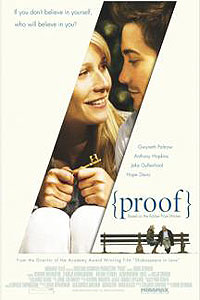Proof (PG-13) ★★★
 Laboring to overcome the inherent difficulties that come with adapting a stage play into a film, Proof nonetheless proves fascinating. The story revolves around a mathematical proof, but it isn't just about numbers. It's about how the proof affects the human relationships surrounding it.
Laboring to overcome the inherent difficulties that come with adapting a stage play into a film, Proof nonetheless proves fascinating. The story revolves around a mathematical proof, but it isn't just about numbers. It's about how the proof affects the human relationships surrounding it.
Story
Based on the Pulitzer Prize-winning play by David Auburn, Proof centers on Catherine (Gwyneth Paltrow), a devoted daughter who must come to terms with the death of her father (Anthony Hopkins). He was a brilliant mathematician whose genius was crippled by mental insanity. As she deals with the devastating loss, Catherine also is confronted with her own fears that she'll end up just like him. She's just as much as genius as her dad, but at what price? The constant threat of madness weighs the girl down. It doesn't help that her estranged sister Claire (Hope Davis) pretty much believes Catherine is headed for the deep end and wants to whisk her away so she can take care of her. At least Catherine finds some solace in one of her father's former math students, Hal (Jake Gyllenhaal), who idolized her father--and has loved her from afar. But even this bright spot in Catherine's life is jeopardized when the proof is finally discovered. And that brilliant, world-changing, complicated proof just blows things all to hell.
Acting
With a film adapted from a play, the onus naturally falls on the actors. Thankfully, in Proof, no one disappoints. Having already tackled the part on the London stage, Paltrow slips into the very unglamorous downtrodden role once again, convincingly playing Catherine with such pathos. It's exhausting to watch at times because we are always kept wondering whether she'll spiral out of control. The actress obviously had to dig deep--maybe too deep--but proves she can handle such affecting material. Luckily, there are more upbeat characters in the movie. Typically relegated to playing depressives in such indies as American Splendor and About Schmidt, Davis gets to be the optimistic one this time. As the perky Claire, who long ago ran away from her dysfunctional family, Davis comes off as the ''bad guy,'' but one who conveys genuine concern for her sister. Also no stranger to indie films, Gyllenhaal breaks away from his usual disheartened fare (Donnie Darko, The Good Girl) and plays a rather animated fellow who is trying desperately to get through to the damaged girl he's fallen for. And then there's the venerable Anthony Hopkins as the demented dad. Although his appearances are brief, they are entirely memorable and aptly detail the unwavering bond between father and daughter.
Direction
Of course you can't help but compare Proof to the Oscar-winning A Beautiful Mind in some ways. Both are about mathematicians whose minds are a little too brilliant for their own good. But while A Beautiful Mind is grand in scope, and is a true cinematic experience, Proof narrows down to the minutiae--but is still intriguing. Sure, a movie about math might seem like a yawner, but you're drawn in by the exceptional people whose genius won't let them cope with the real world. John Madden (Shakespeare in Love) previously directed the London production of the play. He does a nice job keeping things flowing, especially in utilizing the shifts in time, with flashbacks and flash forwards. But the film still has the talking heads problem. On stage, it's acceptable for actors to stand around and give weighty, emotional speeches about love, life and relationships. On film, you want more. Even if Madden takes the camera outside in the snow, or to a university campus, Proof is still peppered with those stage pieces. Luckily for the film, crazy people are fascinating to watch.
Bottom Line
Call me a sucker for these mathematicians-gone-mad movies, but Proof proves you can watch a flick about depressed, schizophrenic people concocting complicated math equations and still enjoy it. I swear!
To get the full Quicklook Films experience, uncheck "Enable on this Site" from Adblock Plus
box office top 10

Civil War Released: April 12, 2024 Cast: Kirsten Dunst, Wagner Moura 11.1M

Abigail Released: April 19, 2024 Cast: Melissa Barrera, Dan Stevens 10.2M

Godzilla x Kong: The New Empire Released: March 29, 2024 Cast: Rebecca Hall, Brian Tyree Henry 9.5M

The Ministry of Ungentlemanly Warfare Released: April 19, 2024 Cast: Henry Cavill, Eiza Gonzalez 9M

Spy x Family Code: White Released: April 19, 2024 Cast: Takuya Eguchi, Saori Hayami 4.9M

Kung Fu Panda 4 Released: March 8, 2024 Cast: Jack Black, Viola Davis 4.6M

Ghostbusters: Frozen Empire Released: March 22, 2024 Cast: Paul Rudd, Carrie Coon 4.4M

Dune: Part Two Released: March 1, 2024 Cast: Timothée Chalamet, Rebecca Ferguson 2.9M

Monkey Man Released: April 5, 2024 Cast: Dev Patel, Sikandar Kher 2.2M

The First Omen Released: April 5, 2024 Cast: Nell Tiger Free, Bill Nighy 1.7M






